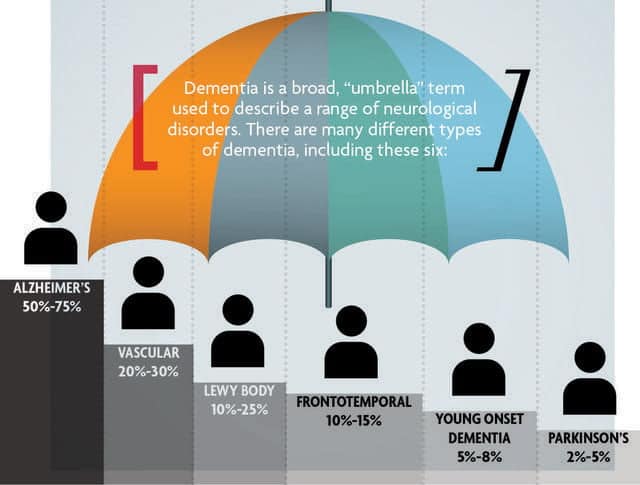Dr. Andrew Kaegi lives in Whitehorse and he has dementia. Talking with Andrew and his wife, Susan Rae, it became clear that the impact of dementia on a person, as well as how each person initially reacts to the news, can vary greatly from one individual to the next. But even more important to quality of life is the way the person with dementia (and their family and friends) deals with it.
“Well, we just have to go through the process,” thought Kaegi when he received the diagnosis.
More on Kaegi and Rae’s journey later, but first, let’s start with the basics. What is dementia?
Dementia is an umbrella term used to describe a set of symptoms affecting brain function. It’s caused by neurodegenerative and vascular diseases or injuries. It is characterized by a decline in cognitive abilities, including memory, awareness of person, place and time, language, basic math skills, judgement and planning. Dementia can also affect mood and behavior. As a chronic and progressive condition, dementia can significantly interfere with the ability to maintain activities of daily living, such as eating, bathing, toileting and dressing.
There is often confusion between dementia and Alzheimer’s disease, which is a type of dementia. Alzheimer’s is a type of irreversible, progressive brain disease that attacks and destroys the brain’s cells, which results in a loss of memory and other essential cognitive functions. The neurodegenerative disease is responsible for causing up to 60 per cent of dementia cases.
Dementia has a significant and growing impact on Canadians. In 2015-16, more than 419,000 Canadians aged 65 and over were diagnosed with dementia. As this number does not include those under 65 who have dementia, nor those who have not been diagnosed, the true picture of dementia in Canada is undoubtedly larger. When the aging demographics in Canada are considered, the potential impact of dementia is significant. It is projected that the combined cost of healthcare and out-of-pocket caregivers will be $16.6 billion by 2031.
The need to address dementia in Canada was emphasized with the passing of the National Strategy for Alzheimer’s Disease and Other Dementias Act in 2017. This act requires the federal Minister of Health to develop a national dementia strategy informed by a national conference and create a ministerial advisory board
The National Conference: Inspiring and Informing a National Dementia Strategy for Canada was held in May, 2018. Participants at the conference included people living with dementia, caregivers, advocacy groups, health professionals, researchers and representatives from provincial and territorial governments. The conference was the first of its kind in Canada and unprecedented in terms of having all stakeholders involved.
Kaegi and Rae attended the national conference, representing northern Canada through the B.C. Alzheimer’s Caregivers Society. They were thrilled to be invited to the conference that was to help shape the national strategy and they were excited with the inclusive approach to the conference.
The National Dementia Strategy has three objectives:
- Prevent dementia.
- Advance therapies and find a cure.
- Improve the quality of life of people living with dementia and caregivers.
Five principles set out values to direct and guide action on dementia in Canada. They are:
- Prioritizing quality of life.
- Respect and value diversity.
- Respect human rights.
- Evidence-informed.
- Results-focused.
More details on the objectives, the principles and other information is available in A Dementia Strategy for Canada: In Brief.
Programs for those with dementia and those who suspect they, or a loved one, may have dementia vary between jurisdictions in Canada. First Link dementia support is the suite of programs offered by the Alzheimer Society of B.C. These programs are designed to help people affected by dementia. First Link helps people living with dementia to better understand the diagnosis and become equipped to cope with the changes to come.
Yukoners living with dementia and their caregivers are supported in multiple programs and in different ways throughout the territory. These include:
- A branch within the Yukon government dedicated to supporting older adults, including those with dementia: The Seniors Services and Adult Protection branch.
- Specialist physician services (e.g. neurology and geriatric psychiatry) available by referral to assist in diagnosis and care management for people living with dementia.
- The Caregivers Support Group. This group is based on a Mutual Aid model, meaning those who attend will learn from other group members who are caring for someone facing the illness.
- Online resources available through the Health and Social Services (HSS) Department, including a list of private caregivers willing to support individuals with dementia in their homes.
Health and Social Services is planning a public education series on dementia in the new year. The series is co-funded by the Centre for Aging and Brain Health Innovation and is entitled “Spark: Shine a Light on Dementia.” It is a five-part series primarily intended for caregivers of people with dementia. Further information on the series will be available in January.
Considering the increasing number of older Canadians, is an increase in levels of dementia inevitable?
As mentioned, one of the three objectives of the National Dementia Strategy is to prevent dementia. There is growing scientific evidence that healthy living from an early age may prevent dementia and delay its onset.
Dr. Reagan Gale said, “ Research is clear that the same behaviours that contribute to chronic health conditions like diabetes and high blood pressure also significantly raise the risk of developing dementia. A study published in the Lancet in 2017 estimated that 1 in 3 cases of dementia could be prevented by making lifestyle changes earlier in life. Behaviour changes like stopping smoking (including cannabinoids as well as tobacco), limiting alcohol intake, and managing high blood pressure will help reduce the risk of developing dementia.”
Evidence also suggests that higher levels of education may improve the brain’s ability to resist, offset and cope with damage and decline. Much more research needs to be done to solidify the information on preventative measures for dementia.





